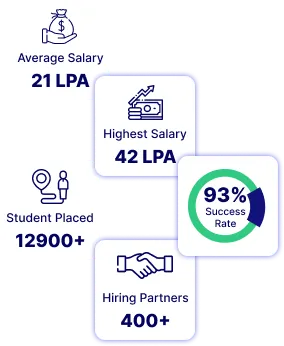Introduction
Numerous multinational corporations and corporate goliaths are very interested in Java Development, which is a booming industry. A skilled software developer or web application developer that has a good grasp of both front-end and back-end technologies is known as a full-stack java developer. Full-stack developers are in high demand, which inevitably leads to higher-paid possibilities everywhere. The complexity of the work, their responsibilities, and the depth of domain expertise are some of the elements that affect the typical compensation of a full-stack developer.
Full-Stack Professionals who support full-stack java development, or the front-end and back-end of an application, are known as Java Developers.
Client-side or interface are terms frequently used to describe a web application's front end. Everything a website user can interact with is included. Think about adding items you want to your cart when you buy on the Amazon website. The page you use and are looking at is known as the front end. The back-ends are the collective term for all the technology that underpins both the user interface and the application. It manages business logic, holds significant data, and responds to user requests.
The demands placed on web developers increased along with the development of new technology. The business today demands that a developer be familiar with the entire stack of technology. This stack progresses from HTML to the backend database. Here, the recruiters anticipate that a full-stack developer will be familiar with all the technologies so that he or she can create an application rapidly.
Now that we know what is a full-stack java developer, this blog highlights whether pursuing a career as a full-stack java developer is worth it or not. Let us begin by learning some basic responsibilities, skills, and salaries of these professionals before arriving at a conclusion.
Skills to Become a Full-Stack Java Developer
Because front-end and back-end development require a different set of abilities, resources, and libraries, a Full-Stack Java Developer must be familiar with all of these fields in order to construct web applications. Following are examples of common and well-known front-end and back-end skills: HTML, CSS, Java Object-Oriented Programming, JavaScript DOM manipulation, SQL/NoSQL
Our Learners Also Read: What Does Full Stack Java Developer Do?
The Duties of a Full-Stack Java Developer
A rigorous task and set of responsibilities are required of a full-stack developer. Professionals are in charge of developing complete web applications using their in-depth understanding of front-end and back-end libraries and frameworks. They must play a crucial part in the design and development of a web application at every level.
Java engineers that work across the full stack must utilize good judgment and analytical skills to lead projects from the back end to the front end and beyond. From design to deployment and management, they must work on each of the many development process stages.
Full-stack developers must also exhibit exceptional abilities in utilizing and applying tools and technologies while advocating for
- Hosting, servers, and networks
- modeling data
- API layer Security, User interface (UI), and Quality Assurance
- Consumer assistance
Full-Stack Java Developer: A Good Career?
A full-stack java developer's profession has a wide range of vertical growth potential with an average growth rate of 13%. In comparison to other occupations, this growth rate is significantly larger. With an anticipated increase in existing numbers, the high demand for Full-Stack Developers and aggressive recruitment by MNCs support the greater growth rate.
Web developers that can examine systems and have a thorough understanding of how each component affects an organization's structure are especially sought after as digitalization continues to grow. The demand for full-stack developers is far larger than the present supply due to the fast-evolving nature of technology today. Starting on a route to becoming a web developer has above-average potential for people seeking a career in that field.
Average Salary of Full Stack Java Developers
Java Full Stack Developer salary in India is 1,350,00 per year as based on a survey. Full-stack developers with less experience often make around 850,000 per year, while those with more expertise can earn up to 22,000 per year.
However, it must be remembered that these salaries are only broad estimates and could change depending on a number of variables.
Experience: Experience is a clear and important determining element. It is directly inversely related to annual pay. The number of hours spent creating, designing, and running the apps increases with experience.
Location: The pay for a Java developer varies depending on where they work.
Employer/Company: Although it may not be as obvious as it first appears, the employer or company has a significant impact on the Java Developer's compensation. Working for a large MNC, for instance, would offer a better pay scale than beginning your career with a startup. Large corporations have adequate cash and fulfill their promise to provide professionals with financial stability. Startups, on the other hand, are expanding businesses with smaller pay scales.
Job Role: Your career's growth trajectory is another consideration. The tasks and responsibilities, as well as the pay, grow as you advance. The net salary of each role is different.
Conclusion
One can begin by taking an online Java course before moving on to an online full-stack Java course. Many specialized roles are created by the various technologies used in full-stack web applications. One might decide to dive deep and pick up numerous talents in various full-stack portions. Client-side scripts, server-side scripts, or databases are all options. New technologies are emerging in each section, for instance, in the client-side script, one can master AngularJS, React JS, or Vue JS. Keep in mind that your demand increases as your skill set expand.
As the last line, a career as a Java Full Stack Developer is good if you are willing to take on the responsibilities, learn the technologies, keep yourself updated with the new ones, and most importantly you are interested in building a career in the field.






